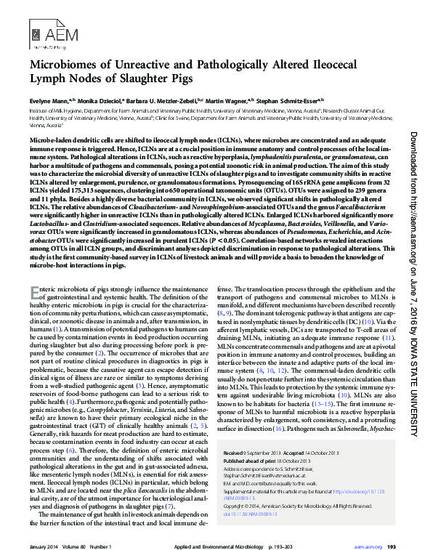
Article
Microbiomes of unreactive and pathologically altered ileocecal lymph nodes of slaughter pigs
Applied and Environmental Microbiology
(2014)
Abstract
Microbe-laden dendritic cells are shifted to ileocecal lymph nodes (ICLNs), where microbes are concentrated and an adequate immune response is triggered. Hence, ICLNs are at a crucial position in immune anatomy and control processes of the local immune system. Pathological alterations in ICLNs, such as reactive hyperplasia, lymphadenitis purulenta, or granulomatosa, can harbor a multitude of pathogens and commensals, posing a potential zoonotic risk in animal production. The aim of this study was to characterize the microbial diversity of unreactive ICLNs of slaughter pigs and to investigate community shifts in reactive ICLNs altered by enlargement, purulence, or granulomatous formations. Pyrosequencing of 16S rRNA gene amplicons from 32 ICLNs yielded 175,313 sequences, clustering into 650 operational taxonomic units (OTUs). OTUs were assigned to 239 genera
and 11 phyla. Besides a highly diverse bacterial community in ICLNs, we observed significant shifts in pathologically altered ICLNs. The relative abundances of Cloacibacterium- and Novosphingobium-associated OTUs and the genus Faecalibacterium were significantly higher in unreactive ICLNs than in pathologically altered ICLNs. Enlarged ICLNs harbored significantly more Lactobacillus- and Clostridium-associated sequences. Relative abundances of Mycoplasma, Bacteroides, Veillonella, and Variovorax OTUs were significantly increased in granulomatous ICLNs, whereas abundances of Pseudomonas, Escherichia, and Acinetobacter
OTUs were significantly increased in purulent ICLNs (P<0.05). Correlation-based networks revealed interactions
among OTUs in all ICLN groups, and discriminant analyses depicted discrimination in response to pathological alterations. This study is the first community-based survey in ICLNs of livestock animals and will provide a basis to broaden the knowledge of microbe-host interactions in pigs.
Disciplines
Publication Date
January, 2014
DOI
10.1128/AEM.03089-13
Publisher Statement
Copyright © 2014, American Society for Microbiology
Citation Information
Evelyne Mann, Monika Dzieciol, Barbara U. Metzler-Zebeli, Martin Wagner, et al.. "Microbiomes of unreactive and pathologically altered ileocecal lymph nodes of slaughter pigs" Applied and Environmental Microbiology Vol. 80 Iss. 1 (2014) p. 193 - 203 Available at: http://works.bepress.com/stephan-schmitz-esser/5/
